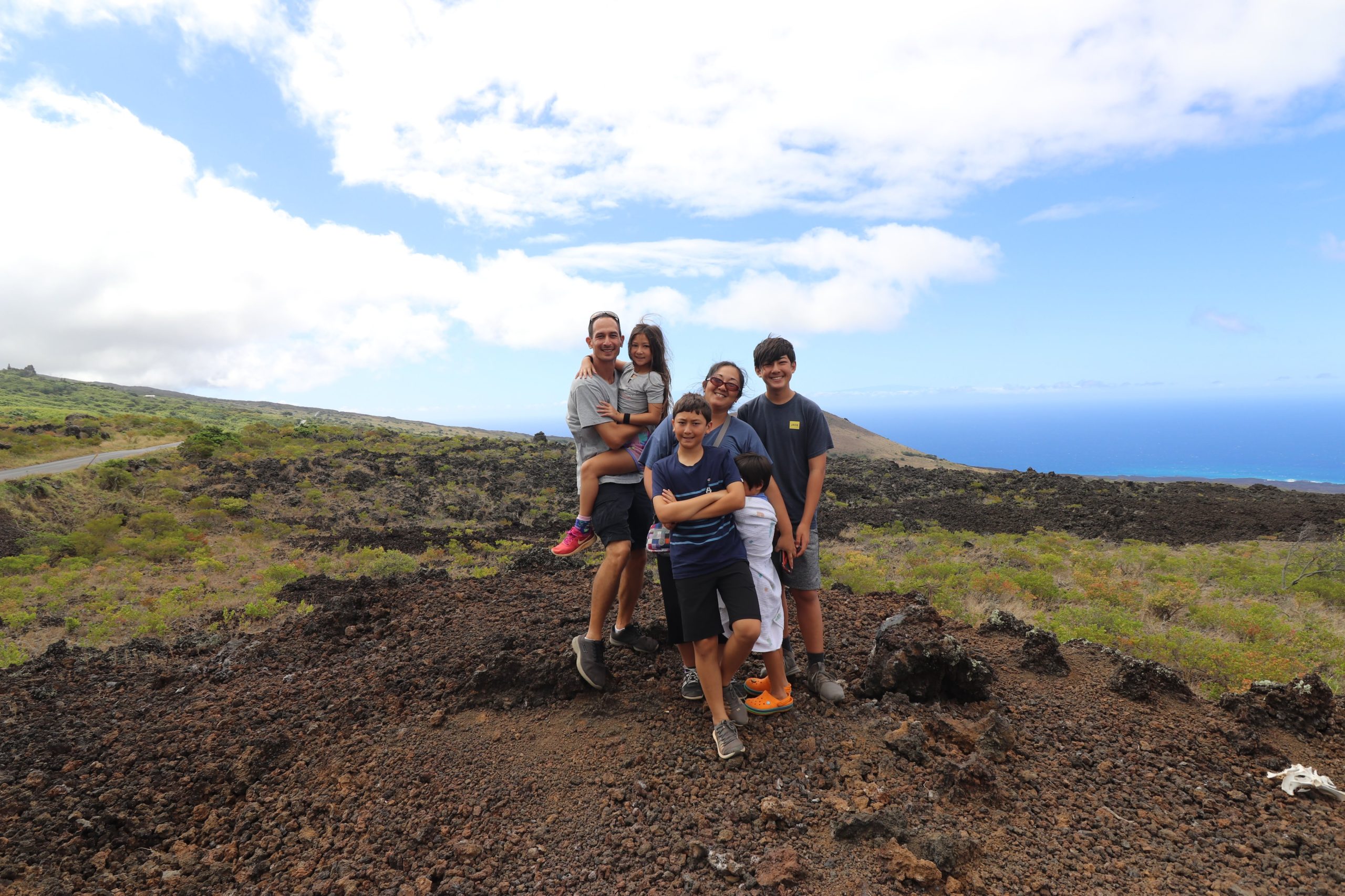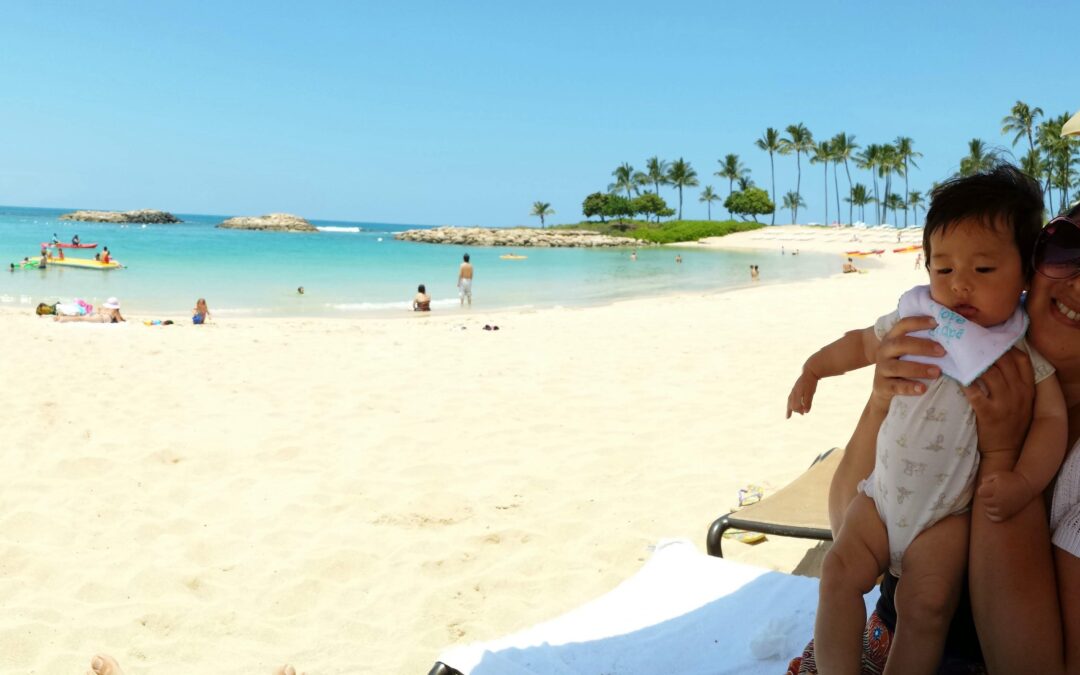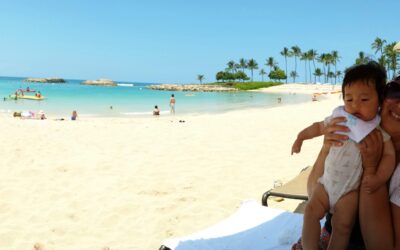Is Hawaii Expensive?
Short answer: Yes! Let’s face it, Hawaii has long been a popular tourist destination, and, for the past 20+ years, Hawaii has also become a favorite place for people looking to purchase second homes, both nationally and internationally. In fact, even the 2008-2009 real estate crisis barely touched Hawaii’s real estate market; instead, the home prices seem to keep going up-up-up! In addition to high housing costs, the majority of items residents need for daily living have to be “imported” or brought in from the mainland so they tend to be more expensive as well. While there are some coastal areas, such as San Francisco and New York City, which will see similar costs of living, compared to most of the US, overall living expenses in Hawaii will simply be higher.
Can I move to Hawaii (Financially)?
I think it’s often possible for many people to live in Hawaii. Really, it’s true! I’ve seen first-hand, many people with various incomes, savings, and lifestyles move to Hawaii. However, Hawaii residents have a phrase that I think applies when considering whether or not to live here and that’s the “price of paradise” or specifically, how you want to live, how long you plan to live in Hawaii, and what lifestyle changes are you willing to make if necessary. I don’t want to make it sound hopeless or unattainable — because it’s not — but if you’re moving away from your support network of family and friends, selling your home, changing your current job and income, and uprooting your children from their schools and activities, then it’s definitely helpful to know what you’re getting into when you chose to live thousands of miles away in the middle of the Pacific Ocean.????️
Of course, like any other state, there is a wide spectrum of income earners among the residents of Hawaii. I think one concept that is helpful for living and thriving in Hawaii is to recognize that living in Hawaii may require slightly different financial and lifestyle perspectives than living in the rest of the mainland US. I’ve met people from the Bay area who felt San Francisco was more expensive than living in Hawaii as well as families who were excited by the cost of private schools in Hawaii because they were cheaper than their mainland counterparts. At the same time, I’ve also met people who must live in multi-generational households, with everyone working full-time, to live comfortably in a middle/upper-middle-class neighborhood. As you can see, it can be very situational, but for most families, to live in Hawaii, will often require at least a dual-income household and/or living in multigenerational households. Many locals will also take on a part-time job(s) – regular or seasonal – on top of their full-time employment to make ends meet or for extra savings. Of course, it also depends on the type of employment and professional background so let’s check out the reality of day-to-day living costs to see what makes sense for you and your family.
Cost of: Rent | Home | Gas | Food | Taxes
Ever since the 60s — perhaps when Elvis started singing and filming about Hawaii? — Hawaii has become a famous dream destination of the world. Like other internationally recognized (and romanticized) cities like New York City, Tokyo, Paris, and more, Honolulu, and pretty much any place in Hawaii, has become the kind of place you put as your desktop wallpaper, dream about for a destination wedding, or save to visit as a bucket list vacation. Hawaii can have such a big draw that sometimes, it only takes one visit before visitors are imagining what it would be like to live in Hawaiian paradise all year long. For many people, Hawaii can be even more desirable than the major metropolises of the world because, not only does Hawaii have the urban landscape (though not nearly as bustling as these big cities) but also world-class beaches, gorgeous sunsets, and overall laid-back atmosphere which makes it a favorite vacation, retirement, and/or second-home destination.
>>Related Article: How much does a Trip to Hawaii Cost?
With such high demand, it’s no surprise that Honolulu has become one of the top 5 most expensive cities in the US to live and work. The U.S. Bureau of Labor Statistics said that it’s no secret why Honolulu is often ranked in the Top 3 Most Expensive Cities in the U.S. based on bestplaces.net; Honolulu’s overall cost index is 69% higher than the average US, food & groceries are 39% higher, housing (homeownership) is 186% higher with an average housing price of $778,600, utilities are 76% higher, transportation is 24% higher, healthcare is 1.7% higher, and other miscellaneous items are 23% higher.
Even knowing these statistics and despite the costs of a trip to Hawaii, many people are still in love with the Hawaiian tropical paradise. So, are you still ready to relocate? Ready for the nitty-gritty breakdown of island living? Then, let’s jump in.
I think first and foremost, let’s address the most expensive part of the equation: housing.
Housing Costs
Rent
Let’s first check out rental options. Rent prices can differ quite a bit based on the area you choose to relocate to, with Hawaii County on the Big Island of Hawaii coming in at the lowest. Unfortunately, that can still be pretty high. Based on data from rentdata.org for Hawaii, as of April 2023, all the counties except for Hawaii County are considered one of the most expensive areas to rent in the United States.
Here are the average rental costs in the state of Hawaii:
Hawaii County (Big Island, Island of Hawaii):
- Studios | $1,116
- One-bedrooms | $1,263
- Two-bedrooms | $1,656
- Three-bedrooms | $2,131
- Four-bedrooms | $2,250
Honolulu County (Oahu):
- Studios | $1,563
- One-bedrooms | $1,716
- Two-bedrooms | $2,247
- Three-bedrooms | $3,193
- Four-bedrooms | $3,827
Maui County (Maui, Molokai, Lanai):
- Studios | $1,532
- One-bedrooms | $1,606
- Two-bedrooms | $1,986
- Three-bedrooms | $2,731
- Four-bedrooms | $2,944
Kauai County (Kauai):
- Studios | $1,436
- One-bedrooms | $1,632
- Two-bedrooms | $2,148
- Three-bedrooms | $2,883
- Four-bedrooms | $3,509
As you can see, rent pricing varies significantly county by county, and some options are quite high compared to what you might see in most of the US rental market. It’s also good to keep in mind that these are averages within each county, so depending on the neighborhood, housing prices may differ. For example, some areas with ocean access will have you looking at hotel pricing for rent. Because many beachfront/beach access properties could easily command a thousand dollars a night or more (depending on the size and location), if you were to actually rent those places to live, the monthly rental costs will be significantly more than what you see listed above.
Homeownership
Unless you’re familiar with a neighborhood (and I mean recently familiar, not like you visited 20 years ago and haven’t been back since), I’d recommend renting instead of purchasing right away. If you’re planning to buy a home in Hawaii, you’ll often be committing to a purchase price of $900,000 or more, so it’s not a bad idea to rent for a while to get a feel for a neighborhood. On a practical level, I would test drive the routes to and from your new place of employment (traffic, especially on Oahu can be terrible so it may end up being a huge factor in where you choose to live), check out the schools in the area if you have children, and just get familiar with the overall vibe of your neighborhood as it can really vary between neighborhoods. For example, we had some friends who loved the Kailua area (eastside) of Oahu and loved that it was near the beach, however, they had two young children and many Kailua streets didn’t have sidewalks; it was also very congested with tourists. They ended up choosing to live long-term in Mililani, a suburban town in the middle of Oahu, which wasn’t as close to the beach but it was more family-friendly with good elementary schools, a lot of established bike and walking paths and playgrounds, and even recreation centers with pools for residents of Mililani.
In addition to single-family homes, in recent years, Hawaii has made a push to build a lot of condominiums – partly due to the expensive housing market and partly due to the “let city be city and country be country” approach which tries to keep a more urban environment near city centers to maximize the options of public transportation and convenience between home, leisure, and workspaces. This has also given rise to the luxury condo market as well, but it might be good to check into condo rental or purchase as well.
Honolulu County
Single Family Homes
| Single Family Homes | MARCH 2023 | FEBRUARY 2023 | MARCH 2022 |
| Median Sale Price | $1,096,250 | $983,500 | $1,150,000 |
| Average Sale Price | $1,400,841 | $1,421,439 | $1,565,912 |
| Homes Sold | 236 | 174 | 330 |
| Median Days on Market | 37 | 41 | 11 |
| Bid Ups | 29% | 24% | 57% |
Condominiums
| CONDOMINIUMS | MARCH 2023 | FEBRUARY 2023 | MARCH 2022 |
| Median Sale Price | $535,000 | $481,000 | $515,500 |
| Average Sale Price | $648,701 | $593,008 | $621,568 |
| Condos Sold | 439 | 325 | 678 |
| Median Days on Market | 24 | 30 | 11 |
| Bid Ups | 23% | 18% | 47% |
Honolulu’s housing market has not kept up with the demand and this is one of the big reasons for the high home prices. In addition, low-interest rates for an extended period of time plus the stimulus have turbocharged the increase of house prices in the Hawaiian islands.
There are developments taking place in the Honolulu city areas of Ala Moana and Kakaako as well as housing developments on the west side of Oahu in Hoopili and Koa Ridge which are expected to provide over 20,000 homes combined for the next decade or so, however, this barely scratches the demand. Currently, you will see many families basically forced to live in multi-generational households because housing permits and development have not kept up with the demand for housing on Oahu. This is something that you may need to consider if you’re planning on living in Hawaii long-term.
Property Tax
Here is one thing that threw me off when reviewing property tax bills in Hawaii. In Hawaii, the land is almost always the most expensive part of the home purchase price. Because of this, you may notice a couple of things while looking at homes in Hawaii: 1) a typical-looking ranch-style home might shock you with a $900,000+ sticker price and 2) because the value is in the land, not the property itself, property taxes do not seem to be as high compared to the contiguous US. For example, when we were living in Minnesota, I happened to notice that the property taxes for our $200,000 home was more than the property tax for my parents-in-law’s $900,000+ home. Since property tax information is public, it’s fairly easy to check out the property taxes of the area you are interested in, but for a quick example, a Honolulu County $1.2 million home had a property tax of $4,800 in 2022 while a $450,000 house in Washington County, Minnesota (suburban area near the Twin Cities Metro) had property tax of $6,028.
Cost of: Rent | Home | Gas | Food | Taxes
Electricity
Hawaii’s average residential electricity expenditure in 2022 was $221.56 per month based on the information provided by the U.S. Energy Information Administration. This is the highest in the country by far with Connecticut being the second at $176.25 per month and the U.S. average coming in at $137.18 per month. Ironically, the information also showed that Hawaii’s average monthly consumption in kWh was actually almost only half of the U.S. average at 515 kWh per month with the U.S. average at 907 kWh per month. Unfortunately, this means that electricity costs in Hawaii are roughly three times the U.S. average. This is surprising, considering Hawaii has pretty stable and moderate temperatures year-round.
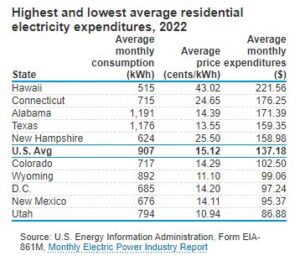
Cost of: Rent | Home | Gas | Food | Taxes
Taxes
Ah, taxes. Everyone’s favorite subject ????. For anyone moving to Hawaii – either via employment or relocating a financial operation to Hawaii — here are some brief descriptions of Hawaii’s various taxes.
General Excise Tax (GET)
Hawaii does not have a “sales tax” or “value-added tax,” but rather imposes a General Excise Tax on all commerce and transactions. While wholesale transactions will have a different rate than retail, the general concept is to levy tax on pretty much everything purchased in Hawaii. This is sometimes unintentionally misleading when visiting Hawaii because the tax rate is quite low compared to the tax rates of other states and counties; for example, I often had friends living on the mainland who loved to shop for certain things in Hawaii because the sales tax was half or less compared to purchasing the same item in their home state. You can get the detailed GET information for the State of Hawaii, however, here is the gist of it: Insurance Commissions are 0.15%, Wholesaling, Manufacturing, Producing, Wholesale Services and Use Tax on Imports for Resale is 0.5%, and all other things — basically everything a consumer would purchase at a retail price — is 4%. Added to that are municipality-based surcharges by county: for the City and County of Honolulu the charge is 0.5%, Kauai County is 0.5%, Hawaii County is 0.5%, and Maui County chooses not to levy a charge. In the end, most often, you’ll see a 4.5% General Excise Tax on any item or service you purchase, and unlike various states that may offer tax-free sales on groceries or other kinds of consumables, in Hawaii, this (approximately) 4.5 to 5% tax is tagged onto everything.
Income Taxes & Brackets
The information below is as of 2023.
Single Filer, Marries/Registered Domestic Partner Filing Separately
| If your Hawaii taxable income is over: | But not over: | Your tax is: |
| $0 | $2,400 | 1.4% of your income |
| $2,400 | $4,800 | $34 + 3.2% of the excess of $2,400 |
| $4,800 | $9,600 | $110 + 5.5% of the excess of $4,800 |
| $9,600 | $14,400 | $374 + 6.4% of the excess of $9,600 |
| $14,400 | $19,200 | $682 + 6.8% of the excess of $14,400 |
| $19,200 | $24,000 | $1,008 + 7.2% of the excess of $19,200 |
| $24,000 | $36,000 | $1,354 + 7.6% of the excess of $24,000 |
| $36,000 | $48,000 | $2,266 + 7.9% of the excess of $36,000 |
| $48,000 | $150,000 | $3,214 + 8.25% of the excess of $48,000 |
| $150,000 | $175,000 | $11,629 + 9% of the excess of $150,000 |
| $175,000 | $200,000 | $13,879 + 10% of the excess of $175,000 |
| $200,000 | — | $16,379 + 11% of the excess of $200,000 |
Married/Registered Domestic filing jointly and Qualified Widow(er)
| If your Hawaii taxable income is over: | But not over: | Your tax is: |
| $0 | $4,800 | 1.4% of your income |
| $4,800 | $9,600 | $67 + 3.2% of the excess of $4,800 |
| $9,600 | $19,200 | $221 + 5.5% of the excess of $9,600 |
| $19,200 | $28,800 | $749 + 6.4% of the excess of $19,200 |
| $28,800 | $38,400 | $1,363 + 6.8% of the excess of $28,800 |
| $38,400 | $48,000 | $2,016 + 7.2% of the excess of $38,400 |
| $48,000 | $72,000 | $2,707 + 7.6% of the excess of $48,000 |
| $72,000 | $96,000 | $4,531 + 7.9% of the excess of $72,000 |
| $96,000 | $300,000 | $6,427 + 8.25% of the excess of $96,000 |
| $300,000 | $350,000 | $23,257 + 9% of the excess of $300,000 |
| $350,000 | $400,000 | $27,757 + 10% of the excess of $350,000 |
| $400,000 | — | $32,757 + 11% of the excess of $400,000 |
Hawaii Income Tax Brackets and Rates: Head of Household
| If your Hawaii taxable income is over: | But not over: | Your tax is: |
| $0 | $3,600 | 1.4% of your income |
| $3,600 | $7,200 | $50 + 3.2% of the excess of $3,600 |
| $7,200 | $14,400 | $166 + 5.5% of the excess of $7,200 |
| $14,400 | $21,600 | $562 + 6.4% of the excess of $14,400 |
| $21,600 | $28,800 | $1,022 + 6.8% of the excess of $21,600 |
| $28,800 | $36,000 | $1,512 + 7.2% of the excess of $28,800 |
| $36,000 | $54,000 | $2,030 + 7.6% of the excess of $36,000 |
| $54,000 | $72,000 | $3,398 + 7.9% of the excess of $54,000 |
| $72,000 | $225,000 | $4,820 + 8.25% of the excess of $72,000 |
| $225,000 | $262,500 | $17,443 + 9% of the excess of $225,000 |
| $262,500 | $300,000 | $20,818 + 10% of the excess of $266,500 |
| $300,000 | — | $24,568 + 11% of the excess of $300,000 |
Gas
Gas pricing is a little tricky since, as we all know, this can fluctuate a lot. However, as compared to the US national average it’s about 30% higher. Generally, it’s often comparable to California gas prices. For example, as of April 24, 2023, according to AAA Gas Price information, today’s average in Hawaii happens to be $4.779/gallon as of April 24, 2023. Hawaii does have Costcos and many have gas stations attached. This has become a popular option for many residents due to the cheaper gas pricing, but it’ll still usually be expensive compared to many states.
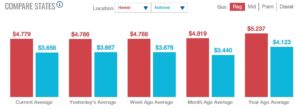
Groceries
Are you ready to be sad? Faith is from Hawaii so, funny enough, when she moved to Minnesota for college, most grocery items and produce seemed “cheap.” LOL. After living on the mainland for over 15 years, however, coming back to Hawaii with a family of six to feed…well, it was a bit of a shock. We were used to the cost of milk being about $1.29/gallon milk; if it approached $2.00/gallon we would balk at the price. In Hawaii, we were staring at a price tag of $4.99, and it was NOT for a gallon of milk, but for a quart. Of course, as we started adjusting to life as a Hawaii local rather than a Hawaii tourist, we realized that not every item took such a large price hike; unfortunately, some things we considered basic items such as milk, cereal, and eggs were noticeably more expensive. For us and many families in the Hawaiian Islands, Costco has become a fully integrated way of island life. In fact, almost everyone I know – from my friend’s household of two to our multigenerational household of eight – had either a Sam’s Club membership, a Costco membership, or both because buying everything from toilet paper to bananas is usually cheaper at a wholesale membership club. Even so, we had to adjust our pricing caps for a few items – for example, while were used to paying $3 – $4 for a box of cereal (and we’re not even going to mention the huge deals we would sometimes find at Minnesota grocery stores!) we now needed to expect $7 – $8 per box. In addition, Faith often found that grocery store vegetables and fruit never seemed as fresh as in Minnesota. And while I’m not sure if that’s something we can say definitively, considering how almost everything needs to be imported, it’s definitely a possibility, especially in the smaller chain grocery stores. A big store like Costco or Target would often have fresher-looking produce. Anyway, this is the reality of Hawaii grocery shopping. On Oahu alone, there are four Costcos with at least one Costco on the islands of Maui, the Big Island, and Kauai. Incidentally, Hawaii Costco stores are the highest gross revenue stores for the Costco company and while the prices might be a little higher than the mainland stores, they are noticeably cheaper than the regular grocery stores. In addition, Costco gas stations sometimes have lines that wrapped around the parking lot or into the street due to the lower gas prices per gallon. There are some studies showing that groceries in Hawaii are about 60% more expensive than the national average, so it’s something that should be taken into consideration if you are planning to move to Hawaii.
As a side note, some might ask about alternative grocery venues like farmer’s markets or locally-sourced stores, to this I will say that whether it’s due to the cost of land, the cost of gardening supplies, or simply because these markets also cater to tourists, you’ll often find that they are more expensive than grocery stores (although they may offer fresher, often organic produce). In any case, it’s not likely you’ll find a deal on a bushel of tomatoes or anything like that.
Cost of: Rent | Home | Gas | Food | Taxes
Financial Expectations
So I’ve laid out various basic daily living costs if you chose to move to Hawaii. While some of these can vary based on location, number of people in a household, and more, hopefully, these descriptions will give you a realistic idea of what living in Paradise would cost for your situation.
With our family of six — with children from preschool to middle school — here are some additional considerations we had when figuring out costs for our family (not all of these are Hawaii-specific):
- Cost of preschool and/or after-school care
- Cost of summer programs and activities
- Cost of extracurricular activities
- Cost of travel – Okay, this might just be our family because of size. Taking plane trips in and out of Hawaii or between islands isn’t too bad, but when you have to multiply the cost by six every dang time it can get expensive. LOL.
- Cost of schooling (public vs. private) – I know what most parents will say because we heard and said it a gazillion times before and after we moved to Hawaii: “We don’t need private schools. They’re crazy expensive, not always worth it, and I’m not doing it.” That said, I can tell you that by the end of elementary school over half of those families, including ours, ended up sending at least one child to a private school. I understand that there are a lot of pros and cons to either type of education as well as serious discussions about economic disparity and education in Hawaii, however, sidestepping those discussions for a moment since it’s a giant onion with lots of layers, I’m just letting you know, if you have children, be prepared to consider and reconsider these options. It’s a conversation that will come up time and again while living in Hawaii.
All in all, just to give you an idea, to be financially comfortable living in Hawaii as a typical 4-person household, the general estimated income is about $200,000+. Of course, there are many ways to save money or make additional income in order to enjoy the island life. In addition to simply scaling back expenses, we know many who move back in with family or take on additional part-time/seasonal work to make ends meet. There are even some local businesses – like farms, tour companies, etc. – that exchange work for discounted room/board, this can be a great option for singles who are looking to live in Hawaii short-term. While visiting with a high school friend, my wife and children met a couple who worked on a farm in exchange for a few months of housing; this was about 5-7 years ago.
Non-Financial Considerations
Okay, I don’t see this mentioned a lot but, as a Hawaii transplant myself, I find that these kinds of non-financial factors can heavily impact a person/family’s decision to stay or move out of Hawaii, sometimes more than the financial considerations. So here are some of the things we’ve seen or experienced:
- Culture shock. I’m sure many people experience this no matter where they move. I mean, NYC is very different from Oklahoma, and it may even feel like you’ve landed in another country! The same is often said of new residents to Hawaii. There are a variety of people living in Hawaii – native Hawaiians, 4th+ generation Asian Americans, recent immigrants (from Asia, Europe, etc.), mainland transplants, military personnel, retirees, and everything in between. People move to Hawaii for different reasons and have vastly different expectations for living in Hawaii. Just know that there is a lot of diversity in the islands – yes, visually, there is a lot of ethnic and racial diversity, but there is also a lot of economic, cultural, and political diversity as well. Give yourself time and space to acclimate and be open to the food, ideas, and people around you.
- The crowds. We used to take our children out to large parks, county festivals, and family activity days all the time in Minnesota and yes, while they would be crowded, they never felt as crowded as activities on Oahu (except maybe the Minnesota State Fair). In Hawaii, Every. Little. Event. often meant lots of time in traffic, circling parking lots over and over again for a place to park, and then weaving through crowds in the hot sun. For example, the Floating Lantern Festival which usually takes place during the Memorial Day holiday is estimated to bring in approximately 40,000 people…to Ala Moana Beach Park, all at once. That’s a lot of people for that space! Even my Hawaii-born wife was flabbergasted by how crowded everything was all the time – she said it just wasn’t this crowded on the island while growing up.
- The traffic. Our experience is mostly on Oahu but I know it can get a little congested on other islands too, especially because some areas have single-lane highways. In terms of Oahu traffic, it’s terrible and there’s no way around it unless you work close to your home or work from home. I think nationwide, Honolulu traffic is one of the worst, often compared to Los Angeles. For most people, jobs are either in town (downtown Honolulu) or on the west side of the island (Kapolei) and both ways have traffic going to and from work every day. My wife worked about 22 miles from home and she was in traffic at least 2 hours every day. If there were stalled cars, accidents, or any traffic situation, you could easily add 10-30 minutes to the commute. There are buses and express buses which she tried to utilize but they weren’t always reliable because they were also subject to traffic conditions. If you can find a place to leave near your work, I think that could make life 100x better, especially in Oahu.
- Island fever. As a family who loved taking little road trips to Duluth, the Wisconsin Dells, Chicago, and more, this hit harder for us than some of our friends in Hawaii – we just got restless. We really missed taking relatively inexpensive little trips with our mini-van and little family. I guess this can also tie into cost because, with our family and financial situation, it was difficult to take big family trips off-island once we moved to Hawaii. I guess, to compensate, we often participated in A LOT of Cub Scout camping, so those were a whole new set of experiences. LOL.
- Public schools and school districts. If you are planning to use the Hawaii Public School System, finding the right educational fit for your child can make a big difference in the quality and comfort of their educational experience. I have had many discussions with other parents about education quality and experiences and I’ve even had families move to different cities just to find schools that were better equipped to work with children and whatever they needed. Simply put, some schools are better equipped to work with children with learning disabilities, gifted children, children with physical disabilities, and even something like having a marching band, robotics team, or certain sports. It really varies so it might be a good idea to check it out before making a long-term housing choice.
- Doctor shortage. I hear about this more often because my wife’s parents are in the medical field, but there are simply not enough doctors in Hawaii. Part of this is because doctors can make a LOT more money on the mainland and the cost of living is high in Hawaii, but it’s also because there aren’t enough healthcare facilities available to hire more doctors on the islands. In any case, sometimes it takes 4-6 months to book a basic appointment, and certain “popular” doctors in various fields can be booked out even further (or they aren’t taking on new patients). Mostly these kinds of things can be resolved by just planning way ahead, but if you or a family member has a condition that needs specific care, it might be good to check that the medical facilities and services you need are accessible in Hawaii.
- Bugs.???? LOL. Okay, I doubt this will make you pack up and get the heck out of Hawaii, but just know that we have giant flying roaches that might aim for your head, big, hairy (non-poisonous) cane spiders that might just pop up in your laundry room, centipedes that can sting you in bed (and hurt like crazy!), and jellyfish/Portuguese man-o-war that can attach to you and sting both in the water and on the beaches (yes, they can still sting when dead). You’ll probably come across these critters at some point in your Hawaii experience (hopefully outside your home) just avoid them if possible.????
Cost of: Rent | Home | Gas | Food | Taxes
The Move to Hawaii
So what do you think? Is there a high price for living in Paradise? Is it worth it?
We personally think the experience is worth it. One thing I just want to instill is that you know what you’re getting into when you decide to make the leap across the ocean. It can be expensive to move to Hawaii (and equally expensive uprooting in a couple of years if you decide that island life is not for you!) To save time, money, and frustration, I think it makes sense to have some financial and mental expectations when you are deciding whether island life is right for you and your family.
We have friends that have moved away from Hawaii only to move back in less than two years (because they miss it so much) but we also know people who prefer the lower cost of living on the mainland and just enjoy taking advantage of as many cheap ticket vacations to Hawaii as they can get their hands on. I think it just depends on what makes sense for you.
For our family, my wife’s entire family lives on Oahu and with her aging grandparents, it just made sense to move to Hawaii when we did. And we loved living here – I mean, even with terrible traffic, the sunsets and rainbows are just gorgeous! Do we recommend island life to others, it depends on what they’re looking for – but if you figure out how to make it work for at least a few years, it can be a wonderful experience…and who knows, maybe you’ll find a way to make it work long-term?!


